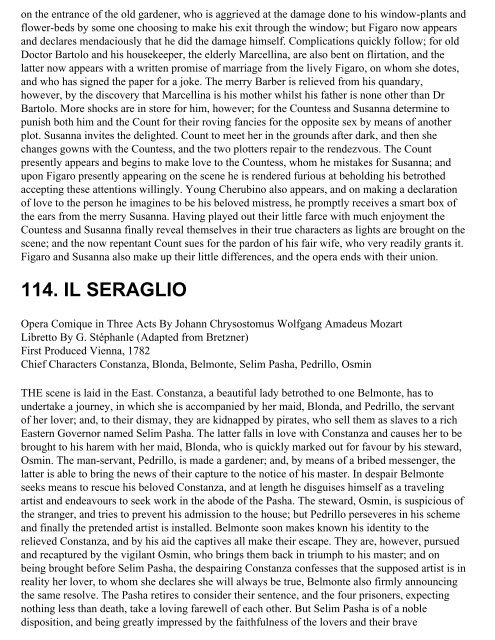Opera Plots I - MDC Faculty Home Pages
Opera Plots I - MDC Faculty Home Pages
Opera Plots I - MDC Faculty Home Pages
You also want an ePaper? Increase the reach of your titles
YUMPU automatically turns print PDFs into web optimized ePapers that Google loves.
on the entrance of the old gardener, who is aggrieved at the damage done to his window-plants and<br />
flower-beds by some one choosing to make his exit through the window; but Figaro now appears<br />
and declares mendaciously that he did the damage himself. Complications quickly follow; for old<br />
Doctor Bartolo and his housekeeper, the elderly Marcellina, are also bent on flirtation, and the<br />
latter now appears with a written promise of marriage from the lively Figaro, on whom she dotes,<br />
and who has signed the paper for a joke. The merry Barber is relieved from his quandary,<br />
however, by the discovery that Marcellina is his mother whilst his father is none other than Dr<br />
Bartolo. More shocks are in store for him, however; for the Countess and Susanna determine to<br />
punish both him and the Count for their roving fancies for the opposite sex by means of another<br />
plot. Susanna invites the delighted. Count to meet her in the grounds after dark, and then she<br />
changes gowns with the Countess, and the two plotters repair to the rendezvous. The Count<br />
presently appears and begins to make love to the Countess, whom he mistakes for Susanna; and<br />
upon Figaro presently appearing on the scene he is rendered furious at beholding his betrothed<br />
accepting these attentions willingly. Young Cherubino also appears, and on making a declaration<br />
of love to the person he imagines to be his beloved mistress, he promptly receives a smart box of<br />
the ears from the merry Susanna. Having played out their little farce with much enjoyment the<br />
Countess and Susanna finally reveal themselves in their true characters as lights are brought on the<br />
scene; and the now repentant Count sues for the pardon of his fair wife, who very readily grants it.<br />
Figaro and Susanna also make up their little differences, and the opera ends with their union.<br />
114. IL SERAGLIO<br />
<strong>Opera</strong> Comique in Three Acts By Johann Chrysostomus Wolfgang Amadeus Mozart<br />
Libretto By G. Stéphanle (Adapted from Bretzner)<br />
First Produced Vienna, 1782<br />
Chief Characters Constanza, Blonda, Belmonte, Selim Pasha, Pedrillo, Osmin<br />
THE scene is laid in the East. Constanza, a beautiful lady betrothed to one Belmonte, has to<br />
undertake a journey, in which she is accompanied by her maid, Blonda, and Pedrillo, the servant<br />
of her lover; and, to their dismay, they are kidnapped by pirates, who sell them as slaves to a rich<br />
Eastern Governor named Selim Pasha. The latter falls in love with Constanza and causes her to be<br />
brought to his harem with her maid, Blonda, who is quickly marked out for favour by his steward,<br />
Osmin. The man-servant, Pedrillo, is made a gardener; and, by means of a bribed messenger, the<br />
latter is able to bring the news of their capture to the notice of his master. In despair Belmonte<br />
seeks means to rescue his beloved Constanza, and at length he disguises himself as a traveling<br />
artist and endeavours to seek work in the abode of the Pasha. The steward, Osmin, is suspicious of<br />
the stranger, and tries to prevent his admission to the house; but Pedrillo perseveres in his scheme<br />
and finally the pretended artist is installed. Belmonte soon makes known his identity to the<br />
relieved Constanza, and by his aid the captives all make their escape. They are, however, pursued<br />
and recaptured by the vigilant Osmin, who brings them back in triumph to his master; and on<br />
being brought before Selim Pasha, the despairing Constanza confesses that the supposed artist is in<br />
reality her lover, to whom she declares she will always be true, Belmonte also firmly announcing<br />
the same resolve. The Pasha retires to consider their sentence, and the four prisoners, expecting<br />
nothing less than death, take a loving farewell of each other. But Selim Pasha is of a noble<br />
disposition, and being greatly impressed by the faithfulness of the lovers and their brave













